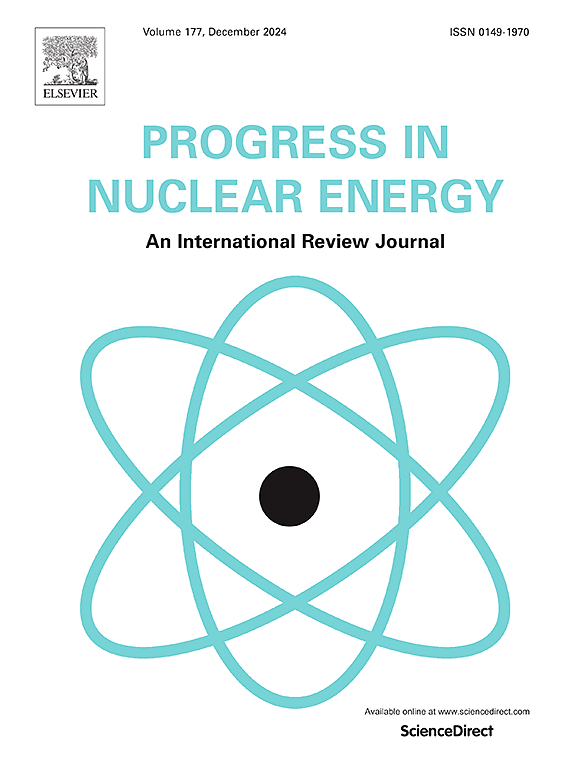Study on the thermohydraulic reaction characteristics of carbon dioxide and liquid lead-bismuth eutectic
IF 3.2
3区 工程技术
Q1 NUCLEAR SCIENCE & TECHNOLOGY
引用次数: 0
Abstract
The integration of a secondary loop supercritical carbon dioxide (CO2) Brayton cycle with a primary loop liquid lead-bismuth (Pb-Bi) fast reactor offers promising advantages, including high efficiency and compactness, making it suitable for diverse power supply applications. However, the safety analysis of heat exchanger tube rupture incidents is a critical aspect of nuclear safety design. In the event of such an accident, CO2 from the secondary loop is introduced into the liquid Pb-Bi pool, raising the question of whether a thermohydraulic reaction occurs between these two substances. This study aims to investigate the potential thermohydraulic reaction between CO2 and liquid Pb-Bi, by developing an experimental setup for analyzing the reaction characteristics. The experimental results indicate that a chemical reaction indeed occurs between liquid Pb-Bi and CO2, resulting in the formation of lead oxide (PbO) and lead carbonate (PbCO3), both of which exhibit a loose structure. The quantity of the reaction products is influenced by the gas phase conditions. These findings are significant for predicting incidents involving heat exchanger tube wall failure and for nuclear safety analysis in liquid Pb-Bi-CO2 reactors.
二氧化碳与液态铅铋共晶的热液反应特性研究
二次回路超临界二氧化碳(CO2)布雷顿循环与一次回路液态铅铋(Pb-Bi)快堆的集成提供了有希望的优势,包括高效率和紧凑性,使其适用于各种电源应用。然而,换热器管破裂事故的安全分析是核安全设计的一个重要方面。在发生此类事故时,来自二次回路的CO2被引入液态Pb-Bi池,这就提出了这两种物质之间是否发生热压反应的问题。本研究旨在通过建立实验装置分析反应特性,探讨CO2与液态Pb-Bi之间潜在的热工反应。实验结果表明,液态Pb-Bi与CO2确实发生了化学反应,生成了结构松散的氧化铅(PbO)和碳酸铅(PbCO3)。反应产物的数量受气相条件的影响。这些发现对于预测涉及热交换器管壁失效的事故和液体Pb-Bi-CO2反应堆的核安全分析具有重要意义。
本文章由计算机程序翻译,如有差异,请以英文原文为准。
求助全文
约1分钟内获得全文
求助全文
来源期刊

Progress in Nuclear Energy
工程技术-核科学技术
CiteScore
5.30
自引率
14.80%
发文量
331
审稿时长
3.5 months
期刊介绍:
Progress in Nuclear Energy is an international review journal covering all aspects of nuclear science and engineering. In keeping with the maturity of nuclear power, articles on safety, siting and environmental problems are encouraged, as are those associated with economics and fuel management. However, basic physics and engineering will remain an important aspect of the editorial policy. Articles published are either of a review nature or present new material in more depth. They are aimed at researchers and technically-oriented managers working in the nuclear energy field.
Please note the following:
1) PNE seeks high quality research papers which are medium to long in length. Short research papers should be submitted to the journal Annals in Nuclear Energy.
2) PNE reserves the right to reject papers which are based solely on routine application of computer codes used to produce reactor designs or explain existing reactor phenomena. Such papers, although worthy, are best left as laboratory reports whereas Progress in Nuclear Energy seeks papers of originality, which are archival in nature, in the fields of mathematical and experimental nuclear technology, including fission, fusion (blanket physics, radiation damage), safety, materials aspects, economics, etc.
3) Review papers, which may occasionally be invited, are particularly sought by the journal in these fields.
 求助内容:
求助内容: 应助结果提醒方式:
应助结果提醒方式:


